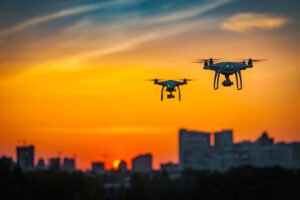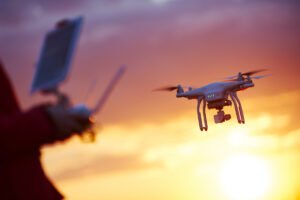NRS § 493.106 is the Nevada law that prohibits turning drones into weapons, such as by equipping one with a firearm or bomb. This offense is a felony punishable by up to five years in state prison.
This statute states:
“A person shall not weaponize an unmanned aerial vehicle or operate a weaponized unmanned aerial vehicle.”
The penalties for violating NRS 493.106 depend on whether the weapon was ultimately discharged or fired:
|
NRS 493.106 violation |
Nevada penalties |
| Weaponizing a drone, or flying a weaponized drone | Category D felony:
|
| Discharging the weapon on a drone | Category C felony:
|
Criminal charges could be reduced or dismissed pursuant to a plea bargain. Possible defenses are that:
- you were the victim of false accusations;
- the drone was never weaponized; or
- the weapon was never discharged (this would reduce the severity of the NRS 493.106 charge)
In this article, our Las Vegas criminal defense attorneys discuss the Nevada crime of weaponizing a drone. Click on a topic to jump to that section:
- 1. Definition
- 2. Penalties
- 3. Defenses
- 4. Deportation
- 5. Record seals
- 6. Related offenses
- Additional resources
1. Definition
NRS 493.106 makes it a felony in Nevada either to:
- weaponize a drone (such as by outfitting it with a firearm, bomb, or other weapon);
- fly (or otherwise operate) a drone that has been weaponized; or
- fire (or otherwise discharge) the weapon that is attached to the drone
Therefore, merely weaponizing a drone is a Nevada crime whether or not the weapon is ever fired. If the weapon does go off, you can still be convicted even if the discharge was by accident.1

It is a Nevada crime to weaponize a drone.
2. Penalties
The penalties for an NRS 493.106 violation turn on whether the weapon on the drone went off:
Simply putting a weapon on a drone — or operating a drone with a weapon — in Nevada is a category D felony. The punishment can include:
- one to four (1 – 4) years in prison, and
- a fine of up to $5,000 (at the judge’s discretion)
Meanwhile, discharging a weapon from a drone you have weaponized is a category C felony. The sentence includes:
- one to five (1 – 5) years in prison, and
- a fine of up to $10,000 (at the judge’s discretion)2
3. Defenses
Three effective defenses to Nevada charges of violating NRS 493.106 include:
- You are the victim of false accusations. If your defense attorney can show that the accuser lied and was just trying to get you in trouble, any criminal charges should be dropped.
- There was no weapon. Unless the prosecutor has solid proof that the drone was equipped with a gun, bomb, or other weapon, then you committed no crime simply by possessing a drone.
- No weapon was discharged. A category C charge can be reduced to a category D charge if your defense attorney can show you never discharged the weaponized drone.
Typical evidence in drone cases includes video surveillance, FAA records, and eyewitness testimony. As long as your defense attorney can raise a reasonable doubt as to your guilt, the charges should be dropped.
Note that it is not a defense that nobody was harmed by the drone.
4. Deportation
An NRS 493.106 violation is presumably a deportable offense in Nevada since it involves weapons and threatens the safety of others.3 Though an experienced criminal defense and immigration attorney may be able to persuade prosecutors to reduce the charge to a non-deportable offense.
5. Record seals
Ordinarily, Nevada convictions for category C and D felonies are sealable five (5) years after the case ends. Though this waiting period is extended to ten (10) years if the felony is considered a “crime of violence,” defined as:
Any felony for which there is a substantial risk that force or violence may be used against the person or property of another in the commission of the felony.4
Presumably, category C convictions of NRS 493.106 violations would be considered a “crime of violence” since it involves the actual discharge of a weapon from the drone. Therefore, the waiting period to get a category C felony conviction sealed would be ten (10) years.
Though it is not clear whether category D convictions of NRS 493.106 violations would qualify as a “crime of violence” since it involves merely putting a weapon on a drone. Therefore, the waiting period to get a category D felony conviction sealed is probably five (5) years.5
Note there is no waiting time before you can petition for a records seal if your NRS 493.106 charge gets dismissed (meaning there is no conviction).6 Learn more about applying for a Nevada record seal.
6. Related offenses
6.1. Failure to register a drone
Failing to register a drone in Nevada carries an FAA fine of up to $27,500. If you fly an unregistered drone unsafely, you face criminal penalties of:
- up to three (3) years in federal prison, and/or
- a fine of up to $250,000
Learn more at the FAA Drone Zone website.
6.2. Flying a drone in a restricted area
Flying a drone in a restricted area (NRS 493.109) is a misdemeanor in Nevada. The penalty includes:
- up to six (6) months in jail, and/or
- a fine of up to $1,000
6.3. Discharging a firearm from a vehicle or structure
Shooting a gun from inside a vehicle or inside a structure (NRS 202.287) only applies when you are acting maliciously or wantonly.
If the location of the vehicle or structure is in a statutorily-recognized populated area, firing a gun is a category B felony in Nevada. The penalty is:
- two to fifteen (2 – 15) years in prison, and/or
- a fine of up to $5,000
If the location is not legally recognized as a populated area, violating NRS 202.287 is a misdemeanor. The penalty is :
- up to six (6) months in jail, and/or
- a fine of up to $1,000

Violating NRS 493.106 is a felony.
Additional resources
For more in-depth information, see these scholarly articles:
- Drone Zoning – North Carolina Law Review.
- Analysis of the Federal Aviation Administration’s Small UAS Regulations for Hobbyist and Recreational Users – International Journal of Aviation, Aeronautics, and Aerospace.
- UAVs: regulations and law enforcement – International Journal of Remote Sensing.
- Comparing public concern and support for drone regulation to the current legal framework – Behavioral Sciences & The Law.
- Enhanced Civil Rights in Home Rule Jurisdictions: Newly Emerging UAS/Drone Use Ordinances – West Virginia Law Review.
Legal References
- NRS 493.106 – Unmanned aerial vehicles: Weaponization prohibited; penalties. 1. A person shall not weaponize an unmanned aerial vehicle or operate a weaponized unmanned aerial vehicle. A person who violates this section is guilty of a category D felony and shall be punished as provided in NRS 193.130. 2. A person who weaponizes an unmanned aerial vehicle in violation of subsection 1 and who discharges the weapon is guilty of a category C felony and shall be punished as provided in NRS 193.130.
- Same.
- See 8 U.S.C. 1227(a)(2)(B).
- NRS 200.408.
- NRS 179.245. These waiting periods are just interpretations of the law. There have been no court cases confirming this. Consult with your attorney about when you should petition the court for a record seal.
- NRS 179.255.

